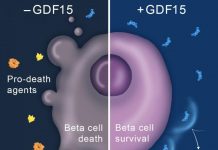December 2009 - New findings by UT Southwestern researchers suggest that a drug already used to treat autoimmune disorders might also help slow the destruction of insulin-producing cells in patients recently diagnosed with insulin-dependent (type 1) diabetes.
In type 1 diabetes, formerly known as juvenile diabetes, cells in the pancreas called beta cells, which produce insulin, are destroyed by an autoimmune process.
Researchers at UT Southwestern and 14 other centers worldwide found that injections of the drug rituximab slowed beta cell destruction in the pancreas of those newly diagnosed with type 1 diabetes for at least a year, suggesting a potential treatment option that might improve management and reduce long-term complications of the disease.
Dr. Philip Raskin, professor of internal medicine at UT Southwestern and an author of the study appearing online and in the most recent New England Journal of Medicine, called the findings "extremely exciting."
"Our findings in no way suggest that rituximab should be used as a treatment or that it will eliminate the need for daily insulin injections," said Dr. Raskin, principal investigator of the trial�s local effort. "This is not a cure for type 1 diabetes.
Continue Reading Below ↓↓↓
"The results do, however, provide evidence that B cells play a significant role in type 1 diabetes and that selective suppression of these B cells may deter the destruction of the body�s beta cells."
Prior research has shown that two types of immune cells � B cells and T cells � help trigger type 1 diabetes. T cells attack and destroy the insulin-producing beta cells. The B cells, however, don�t directly attack insulin-producing cells, but researchers have speculated that they trigger the T cells to attack. Rituximab directly attacks and destroys the B cells.
For the current study, researchers conducted a randomized, double-blind study in which 81 participants received infusions of either rituximab or a placebo once a week for four weeks. The participants, who ranged in age from 8 to 40 years and had been diagnosed with type 1 diabetes within 100 days of enrollment in the study, returned approximately every three months for two years to undergo blood tests and meet with a physician. Two-thirds of the 81 participants received the drug.
The scientists found that after one year, the participants who received rituximab needed lower doses of insulin and were able to produce more of their own insulin than those who received the placebo. They also had better control of their blood sugar.
Dr. Raskin said researchers do not think rituximab could ever be used to completely reverse type 1 diabetes because the pancreas typically is too damaged by the time diabetes is diagnosed.
He also said that while the exact mechanism of how rituximab affects type 1 diabetes remains unclear, the study clearly shows that a therapy that targets B cells may improve beta-cell function in early type 1 diabetes.
The next step, Dr. Raskin said, is to evaluate the potential effects of rituximab in diabetes.
Other UT Southwestern researchers involved in the study include Dr. Perrin White, professor of pediatrics; Dr. Bryan Dickson, associate professor of pediatrics; Dr. Soumya Adhikari, assistant professor of pediatrics; Dr. Mark Siegelman, associate professor of pathology; Marilyn Alford, senior advanced practice nurse in internal medicine; Tauri Harden, a former advanced practice nurse in internal medicine; Erica Cordova, registered nurse at Parkland Memorial Hospital; and Nenita Torres and Maria Lourdes Pruneda, senior research nurses in internal medicine.
The study is supported by the Juvenile Diabetes Research Foundation International, the American Diabetes Association and the Type 1 Diabetes TrialNet Study Group, a clinical trials network funded by the National Institutes of Health.
Source: UT Southwestern









